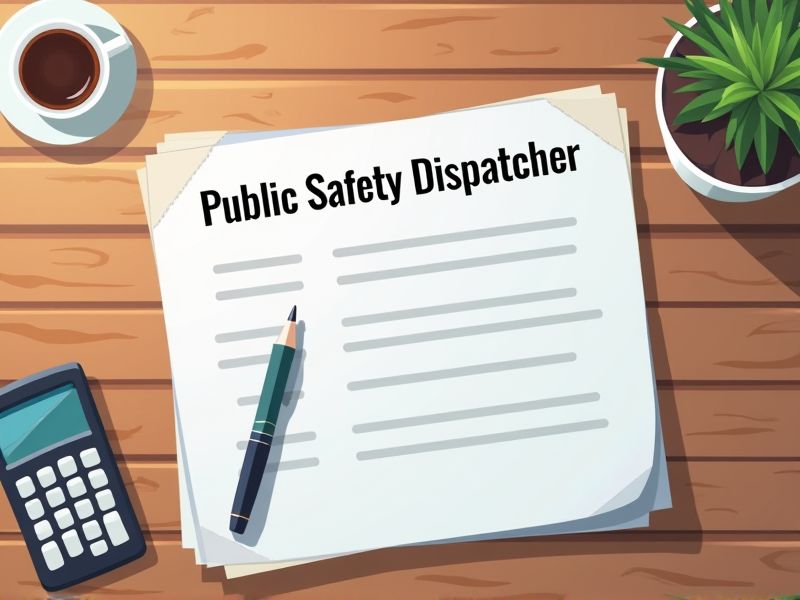
Public Safety Dispatchers play a crucial role in coordinating emergency responses, making their job inherently high-pressure and complex. Certifications ensure they possess the necessary skills to efficiently manage stressful situations and communicate effectively with emergency personnel. These credentials also set a standardized level of competency, reducing errors and improving overall public safety outcomes. Below are several key certifications that might be required for a Public Safety Dispatcher.
Emergency Medical Dispatcher (EMD) Certification
Emergency Medical Dispatcher (EMD) Certification provides public safety dispatchers with essential medical protocols that guide them in giving accurate, lifesaving instructions over the phone. This certification ensures dispatchers can assess emergency situations effectively, aiding in the prioritization and allocation of emergency services. It standardizes the process of handling medical emergencies, reducing the likelihood of errors and improving response outcomes. EMD-certified dispatchers increase the overall efficiency and reliability within the emergency response system, enhancing community trust and safety.
Public Safety Telecommunicator Certification
Earning a Public Safety Telecommunicator Certification ensures standardized training for public safety dispatchers, enhancing their ability to handle emergencies efficiently. This certification equips dispatchers with critical skills in communication, stress management, and technology use, reducing response errors during crises. Certification acts as a benchmark of professionalism, increasing public trust in emergency services and the individuals who coordinate them. Certification results in improved interagency communication, aiding in collaborative efforts during large-scale emergencies.
Computer Aided Dispatch (CAD) Certification
CAD certification is essential for public safety dispatchers as it ensures they have the necessary skills to efficiently manage emergency response systems. With this certification, dispatchers are better equipped to handle high-pressure situations, leading to faster and more accurate emergency response. Training in CAD systems minimizes errors and improves communication between dispatchers and emergency responders, enhancing overall public safety. As technology evolves, certified dispatchers can adapt to new systems, maintaining efficiency and effectiveness in emergency management.
CPR/AED Certification
CPR/AED certification enables public safety dispatchers to provide accurate guidance during medical emergencies, increasing chances of survival until professional help arrives. Dispatchers with this certification can quickly assess whether CPR or AED intervention is necessary, effectively bridging the gap between the call and on-site emergency response. Proper training allows dispatchers to remain calm and composed, ensuring clear communication with the caller in high-stress situations. Certification enhances the dispatcher's ability to serve as a critical link, improving overall community safety outcomes.
First Aid Certification
Obtaining a First Aid Certification equips public safety dispatchers with essential knowledge to guide callers during medical emergencies. This skill enables dispatchers to provide accurate and potentially life-saving instructions before professional responders arrive. First Aid Certification enhances the dispatcher's ability to assess situations, improving decision-making under pressure. This training increases public trust in dispatch services, ensuring a more effective emergency response system.
Crisis Intervention Certification
Crisis Intervention Certification equips public safety dispatchers with crucial skills to effectively manage high-stress situations and support individuals in distress. Certified dispatchers can provide immediate, appropriate guidance, reducing the risk of escalation and promoting safety for all parties involved. This certification also enhances the dispatcher's ability to communicate with individuals experiencing mental health crises, ensuring a more empathetic and informed response. By standardizing training in crisis situations, public safety agencies foster a more consistent and reliable service to the community.
FEMA ICS-100: Introduction to Incident Command System
Public Safety Dispatchers need the FEMA ICS-100 course to understand the standardized framework for coordinating responses during emergencies. This knowledge ensures effective communication and coordination across various agencies during incidents. Training helps dispatchers grasp the structure of command systems to streamline disaster response efforts. Understanding ICS principles enhances their ability to manage resources and prioritize response actions effectively.
Active Shooter/CBRNE Awareness Training
Active Shooter/CBRNE Awareness Training equips public safety dispatchers with the knowledge to efficiently coordinate emergency services during critical incidents. Accurate information handling by trained dispatchers can reduce response times, potentially saving lives in high-stress situations. Training enhances dispatcher's ability to assess threats, ensuring appropriate resources are allocated swiftly. Understanding CBRNE threats helps dispatchers mitigate risks by providing clear, informed instructions to both first responders and the public.
Communications Equipment Operation Certification
Communication Equipment Operation Certification is needed for Public Safety Dispatchers to ensure proficiency in using complex dispatch systems, which directly impacts response times and public safety outcomes. Proper certification standardizes training, thereby reducing the likelihood of errors during critical situations. It ensures dispatchers can efficiently manage multi-channel communications, which is vital in emergencies. Certification also enhances accountability and professionalism within emergency communication roles.
Public Safety Answering Point (PSAP) Certification
Public Safety Answering Point (PSAP) certification ensures dispatchers have the necessary skills and knowledge to handle emergency calls effectively, leading to improved response times and outcomes. Lack of standardized training can result in errors or delays in emergency situations, jeopardizing public safety. Certification programs provide dispatchers with updated protocols and technological advancements, which are crucial for efficient communication and resource management. The standardized approach fosters consistency in emergency response, building trust between the community and the emergency services.
Summary
When you pursue certifications as a Public Safety Dispatcher, you enhance your communication and crisis management skills. This competence can lead to increased efficiency and effectiveness in emergency response situations. Certification often results in higher job satisfaction and career advancement potential. You might also experience greater recognition and respect within your professional community.
